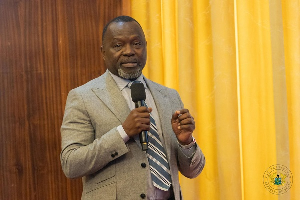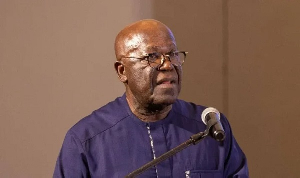In the run-up to the year 2000 elections, the then opposition challenger J.A. Kuffuor promised Ghanaians a Golden Age of Business should the NPP come to power in 2000. This was supposed to be a policy that was to encourage massive private-sector participation in business that would in the short to medium term lead to this sector becoming the engine of economic growth in Ghana propelling the country towards the so-called vision 2020 objective of middle-income status.
However, many of us who have been watching the Ghanaian business system carefully for some years then, were pretty sceptical of the ability of this policy to be successful looking at the government?s financial constraints especially with the nature of debt that the PNDC/NDC governments left to the incoming NPP government as well as the level of indiscipline within the system.
With the entry into HIPC status and the supposed savings it brought the country in terms of the level of debt and debt-service, one would have expected the government to invest substantially in improving infrastructure that would aid the achievement of this ?golden age?? but of course at this time we have no details on any such investment but rather can see for ourselves that we are not on any move towards the so-called golden age.
One thing though that we Ghanaians must know for sure is the fact that, for us to be able to make a positive move towards the golden age promised by the Kuffuor government, we must develop an attitude of respect for the laws that govern the conduct of business in our country. We must understand that these laws are made primarily to ensure fairplay and encourage business efficiency which in the long-run will lead to economic growth and success and finally carve a path towards the golden age we all crave.
It is with the above in mind that I write to comment on the recent initial public offering (IPO) of Cal Merchant Bank on the Ghana Stock Exchange that officially closed on 1st of October 2004. Cal Merchant Bank (Cal Bank), we mostly know, is mainly a merchant bank that has been existent in Ghana now for round about a decade. It has successfully opened branches in Kumasi, Takoradi etc. which to onlookers has signified its successful operation in Ghana over this period. The bank, seeking to improve its service to customers, and in the end its own profitability, decided somewhere along the line to raise money from the general public for this purpose in the form of an IPO on the Ghana Stock Exchange (GSE).
The SEC approved the IPO after the bank satisfied the conditions required for such an event and so the bank went ahead to issue shares through the GSE inviting the general public to purchase them. Without boring readers, I would state that the process was supposedly governed by the Companies Code of Ghana (1963) and the SEC Regulations (2003), Legislative Instrument (LI) 1728.
All went well for Cal Bank as they raised what they had declared they wanted to in accordance with the rules that govern the IPO. However, maybe as a surprise to the bank and its receiving banks and brokers, the offer was over-subscribed by 450%. This in a way was probably due to investor confidence in the bank as well as good marketing by its brokers etc. and supposedly would have been good news for the bank.
However, according to the rules that govern the event, the bank was required to state an upper limit above the 54 billion cedis they wanted to raise in case of over-subscription. Since they stated their upper limit as the 63 billion cedis, they were barred by the laws governing the IPO from raising any more than that and so, would be expected to return any excess funds above this limit to their owners in case of further over-subscription. From my understanding of the law, if they had wanted to keep more than the 63 billion cedis, then their upper limit should have stated the higher amount and not the 63 billion cedis. In this case, they collected from investors an amount of 240.45 billion cedis over and above the 63 billion cedis limit they ahd filed with the SEC.
Lo and behold, and as many would expect from the ?Ghanaian businessman? when it comes to the law, as soon as Cal Bank and their brokers namely Databank, NTHC, EBG Brokers, Strategic African Securities, Merban Stockbrokers, SG-SSB Bank realised that the over-subscription had made available much more than their prediction, there was an attempt (I stand to correction) to initiate a process to bend the law. Most notable was the statement by Ken Ofori-Atta (Databank?s boss) calling for a review of the laws that govern such business (not a bad idea if need be), but for the fact that he was calling for this review to enable Databank, Cal Bank and its other brokers and receiving banks the chance to keep the excess funds and then calling the SEC leadership a failure for refusing to budge was un-professional and out of order. Ofori-Atta?s line of action was rather worrying especially coming from a so-called leader in the Ghanaian business community. One would have expected that with his work experience in investment banking with the likes of Salomon Smith Barney etc. he would know better that the SEC was not created to serve the likes of him and Databank but rather to ensure that they operated within the law. Aside this, one would also have expected that the responsibility for being able to estimate and predict the level of subscription to the IPO was that of the likes of his outfit. A more thorough and professional job would have then allowed Cal Bank to set a much more appropriate upper limit that would have enabled it keep much more than they can in this case.
It is surprising to realise that though Cal Bank primarily has fallen foul of Act 179 section 284 (4) of Companies Code Ghana (1963), all that the SEC?s director of marketing research & development (Mr. Ashong-Katai) can offer in statement to the papers & thus the concerned public, is that the SEC is satisfied because ?efforts? are being made to refund monies to investors. If he must be reminded, the law says ?refunds must be made within 14 days of closure of the offer if it is to attract no interest fee but however, any payment made after the 14-day deadline will attract a payment of 5% in interest charge? so the issue is not the attempts being made at refunds but rather whether the late refunds are being made with the 5% interest charge it should legally be attracting!!! Why has the SEC turned a blind eye to the law in favour of Cal Bank its receiving banks & brokers? Will anybody be wrong in alleging collusion between Cal Bank, its receiving banks, brokers & the SEC to defraud investors judging by the way the SEC is approaching this whole unfortunate incident?
Many of us who know Ghana have always been sceptical of Ghana business and our ability to achieve the so-called Golden Age promised by Kuffuor and his government. The situation above is just one reason why. In Ghana, those of us who have had to deal with anything in business in the country know that the government, the business community and the so-called regulators are all on a totally different plane or reading from a different page (in many cases deliberately) when it comes to the law and business development as a whole. Comparing regulatory bodies in seriously business-minded countries to those that exist in Ghana, one can only say that in Ghana, they are nothing but toothless bulldogs!!! I mean, in the case of the SEC, even after Ofori-Atta had called them a failure, they have by their conduct given weight to his view.
Unfortunately, with the kind of headless chicken approach to business regulation by government, business community and regulators, Kuffuor?s many trips abroad in the past and undoubtedly in the future will only be nothing but the equivalent of sight-seeing trips. At the moment, what Ghana needs desperately amongst other things is foreign cash inflow through investment from abroad and also the forming of partnerships by international investors with local entrepreneurs. This will not only aid job creation within the economy but will also go a long way to stabilise the cedi and thus cushion the country from external shocks to the system. However, with such a weak approach to business regulation, which international investor will put their hard-earned funds into our economy?
In any serious business environment, the government in consultation with the business community and other stakeholders make rules governing business like we have with the companies? code of Ghana (1963). The government then sets up the regulatory bodies whose job it is to monitor and ensure that all parties to business conform to the rules. These regulators having a 100% government backing have power to clamp down on any parties to business that fails to conform to regulation. The current situation in Ghana however where there is a general lackadaisical attitude to duty on the part of the regulator as is in this case, only creates room for one party to defraud another & in this case, as it looks, investors are being defrauded by Cal Bank primarily and maybe Databank and the other receivers and brokers.
The performance of regulators is very important to international investors when they consider investing in Ghana because a good regulatory system reduces greatly the risk premium for doing business in any environment. A good regulatory system will make an investment much more profitable for the above reason and thus all the more appealing to the investor. How do we expect to compete with the economies of the Middle East and South East Asia when our regulators and local businessmen do not take the law seriously? Why will the West not seek investment in these regions instead of in Africa and in Ghana for that matter? These are the questions that we Ghanaians should ask ourselves. These are the questions the government & business community need to ask themselves. Above all, these are the questions the director and staff of the SEC should be asking themselves everyday till they can actually do something right.
These may seem harsh words, but let us not wait till 2020 when we have failed to achieve our middle-income status goal, to begin asking these questions, for once again, we will look the fools to the international community like we have looked in the past.















